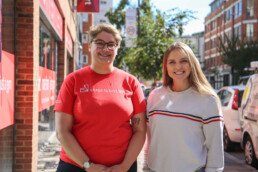City life | By Matthew Little
Nursing students fight against knife crime in London
A team of City’s nursing students has been teaching life-saving skills to young Londoners, who are most at risk of experiencing youth violence.
As part of the charity StreetDoctors, Aoife Scanlan (BSc Children’s Nursing) and Rachel Moisan (BSc Adult Nursing) have been visiting schools and youth centres across North-East London, teaching 11 to 25 year-olds first-aid and classes on what to do if someone is bleeding.
StreetDoctors is dedicated to teaching life-saving skills to young people who are most at risk of experiencing youth violence. With 500 volunteers across 17 UK cities, StreetDoctors has worked with 5,174 young people to date.
After being faced with the aftermath of a stabbing incident while on her second-year placement at an A&E department in a North London hospital, Aoife joined StreetDoctors to help save lives. She says “during my placement, I helped treat a 15-year-old boy with abdominal stab wounds. His injuries were not life threatening but there was a lot of blood everywhere.
“The scariest part was how young the boy looked. He was not particularly big or tall, he was just a child. He got to a hospital in time but others are not so fortunate. I joined StreetDoctors to help teach life-saving skills to young people which could help stop lives being lost on the streets”.

Speaking on how they lead the classes, 22-year-old Rachel says “we start with a basic biology lesson, going through the human body, how many organs and how much blood we have and what happens if you lose a particular amount of blood.
“Using a spoon and a bottle of blackcurrant squash, we show what would happen if you remove the knife from a victim. The liquid imitates blood and the bottle acts as the body”.
There have been more than 20 fatal stabbings in the capital since the start of 2020 and both Rachel and Aoife admit there is an emotional toll when leading the classes.
Aoife says “a lot of the children we teach have carried knives or have criminal records. Some of them do not want to be there and have chosen to accept this as their life”.
Rachel adds “the stories we hear in the classrooms can be very hard to take in, they can range from kids as young as 11 saying that they have lost a friend or family member to knife crime”.
Despite the harsh stories they hear, Rachel and Aoife feel their work with StreetDoctors is making a positive impact.
Aoife says “a lot of the kids do not trust authority figures. We have to help them get past their preconceived ideas, some even being that if they call the police, their phones will be tracked.
“That is why StreetDoctors is so important because we are there to reassure them and to talk to them as people who are closer to their age group”.
Looking to the future, Rachel and Aoife have set their sights on careers in nursing and believe the work they are doing with StreetDoctors will help prepare them.
Rachel says “youth violence is extremely prevalent in London and that is something the NHS is trying to cope with. It is important for us to keep experiencing shock when we hear these stories as we cannot become desensitised to it”.
“Hearing such stories from young people is much more telling than listening to examples in lectures or watching reports on the news. The shock reminds us that the stories are real and that the children are human beings, not just statistics” Aoife says.